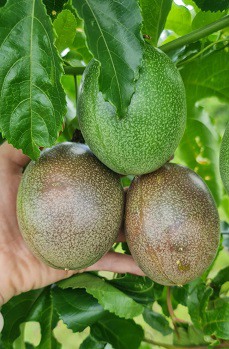 “I think passionfruit has long been a neglected product – few farmers grow it as a top priority crop and almost no-one goes to the store to buy passionfruit. We want to change that,” says Alex de Sousa of Aril Farms, a name he’d like to be associated with high-quality passionfruit.
“I think passionfruit has long been a neglected product – few farmers grow it as a top priority crop and almost no-one goes to the store to buy passionfruit. We want to change that,” says Alex de Sousa of Aril Farms, a name he’d like to be associated with high-quality passionfruit.
Four years ago he started testing passionfruit to counter the meagre fruit, also called grenadellas in South Africa, one sometimes finds at give-away prices.
Besides passionfruit, pomegranates, prickly pears and gooseberries were established by Alex and his wife Dr Karina de Sousa, postdoctoral fellow in audiology at the University of Pretoria during the week and farmer and donkey-rescuer over the weekend, her father and a friend who helps a lot when Alex can’t be at the farm since he is often away for his job in the mining industry.
The prickly pears have been doing “very, very well”, supplied to Nuleaf where it is repacked for Pick ‘n Pay in their distinctive packaging. This year’s focus in the young Wonderful pomegranate orchard has been on vegetative growth while the passionfruit was keeping them “very busy”.
Blowing life into moribund category
When their passionfruit orchards in Zusterstroom, between Bronkhorstspruit and Groblersdal, just started bearing, they took samples to Spar stores in Gauteng and Mpumalanga to whet the appetite for high-quality, large passionfruit (some with the diameter of a mango). One has to do the ground work to find clients, he believes.
“One store manager told us they’re lucky if they sell five or ten punnets of passionfruit a week, but I left a hundred punnets with him and asked them to just give it a go. A week and a half later they re-ordered another hundred punnets,” Alex recounts.
Now, he says, if they put down two pallets at the Johannesburg municipal market, it’s sold by the next day.
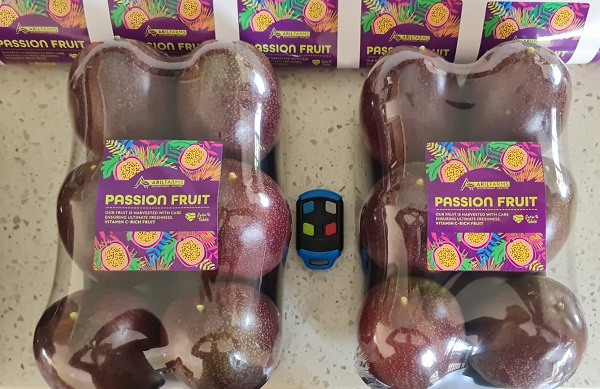
“We work with Subtropico market agents at the Johannesburg, Pretoria Tshwane and Cape Town markets. I have been very impressed with Subtropico. Hans Steyn from Johannesburg Subtropico stood by us when we were developing the brand, giving us feedback on what works on the market and what doesn’t.”
In the Western Cape Aril Farms passionfruit is repacked and sold by Woolworths, while it is also carried by Food Lovers Market.
He continues: “The quality of the fruit has basically sold itself. Now we’re at a stage where we have to tell our clients that at the moment we cannot supply more.”
Exponential expansion
That is why they are expanding at an exponential rate, planning to double the volumes over coming years through new orchards both in the Wilge River Valley as well as in Yzerfontein in a joint venture with Anton and Makkie Bester of Fynbos Gardens, on the West Coast in the Western Cape.
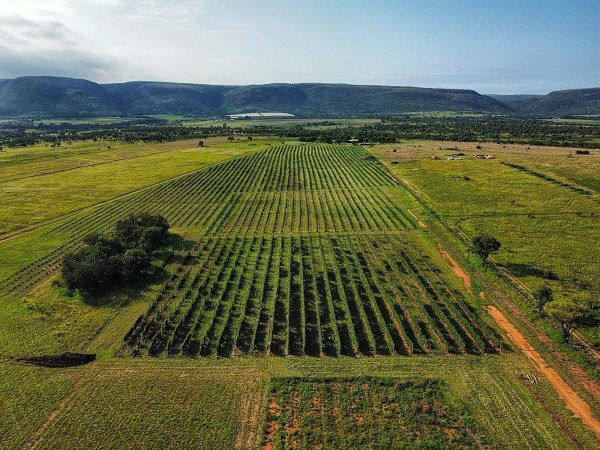
“We’ve been very surprised at the success but it’s not been an easy thing to grow. Our winter gets cold – in 2019 it reached a record -14°C here in the valley – so we’ve had to work out how to get our passionfruit through the winter (we’ve found that calcium helps) and we started with eight lines on which we experimented: fertilization and no fertilization, chemical and organic fertilization, pruning and no pruning (definitely pruning). And when we finally found the winning formula, we planted our first three hectares last year.”
Their fruit has a pulp-to-skin ration of 60%, even going as high as 70% late in the season. The unusual size is not necessarily a genetic attribute, he believes, but results from the cultivation recipe they have finessed. For one thing, he says, the vigorous leaders have to be pruned to obtain size on fruit.
Zero reliance on Eskom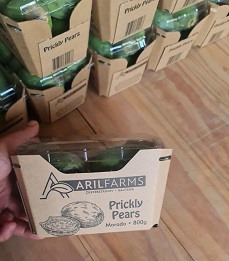 This season their tonnage will be between 60 and 80 tonnes (up from 7 tonnes last year) which they pack in the new packhouse they built and fitted out mostly by themselves, even the packline.
This season their tonnage will be between 60 and 80 tonnes (up from 7 tonnes last year) which they pack in the new packhouse they built and fitted out mostly by themselves, even the packline.
Right: the distinctive packaging of their prickly pears
Another piece of equipment that Alex singles out, has been their electric vehicles procured from Eleksa, the first registered fully electric vehicle company in South Africa.
“When we inspect the orchards, that means we’re checking 25 harvest lines per hectare, each 2.4m high – that’s 12.5km of intensive inspections on 5 hectares – and then you’ve only walked one side of the line! The farm has been built on the back of the electric vehicles from Eleksa that we use.”
In fact, Alex adds, the former game farm has never been on the national electricity grid and from the start, orchards and dams were established with a totally solar-power operation in mind. Topography helps to pump water to the orchards for low-pressure drip irrigation.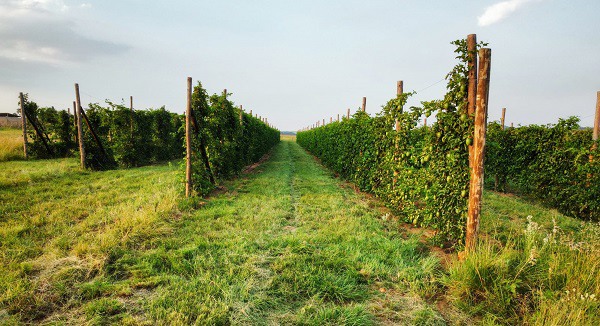
Plans to go organic
Alex credits the help they have received: early in their passionfruit-farming career he was seized by panic when there was no fruit set. Kevin Language from InteliGro in Groblersdal visited the orchards and assured him the fundamentals were in place, but they needed to bring in bees to address inadequate pollination (the area is naturally grassveld, with mostly cattle farms).
“We now bring in a minimum of six hives per hectare. Without bees we’d get nowhere with passionfruit. But because passionfruit flowers continuously, bee safety is a big risk for us and we literally can’t spray any chemicals. We put out CeraTrap for fruit flies and Andermatt Madumbi's Eco-Bb which is Beauveria bassiana, a shortlived fungus and bio-insecticide against insects like thrips.”
The manure that they compost for a year does attract fruit chafer larvae, which are a pest in their adult stage on the early fruit, but it’s a balance one has to strike, he remarks. “We want to go totally organic in future.”
Their immediate plan, apart from the expansion they’ve undertaken, is to become Global GAP-accredited: there has already been interest from exporters in their unusually large fruit.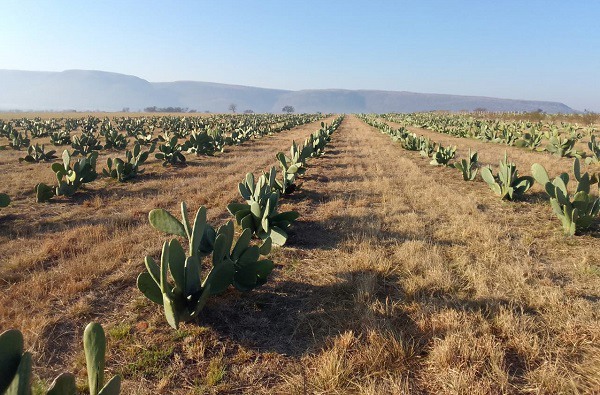 Prickly pears, mostly Morado (photos supplied by Aril Farms)
Prickly pears, mostly Morado (photos supplied by Aril Farms)
 For more information:
For more information:
Alex de Sousa
Aril Farms
Tel: +27 82 306 4000
Email: alex.desousa360@gmail.com
